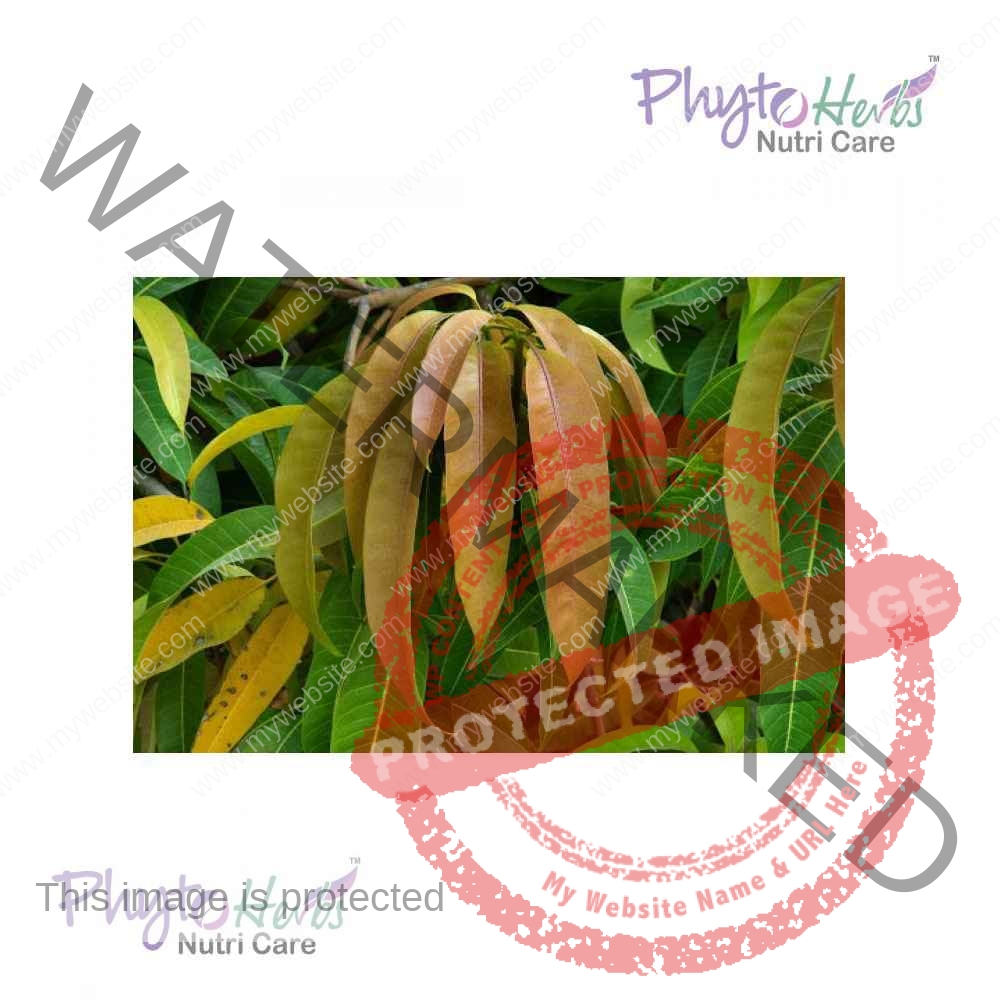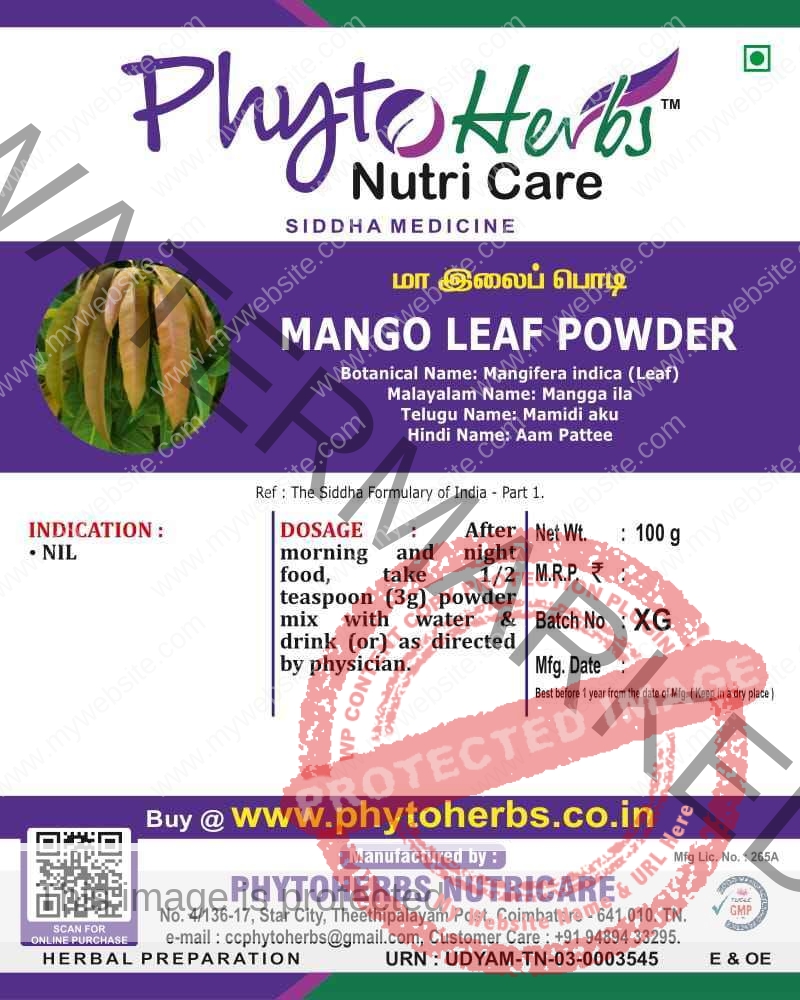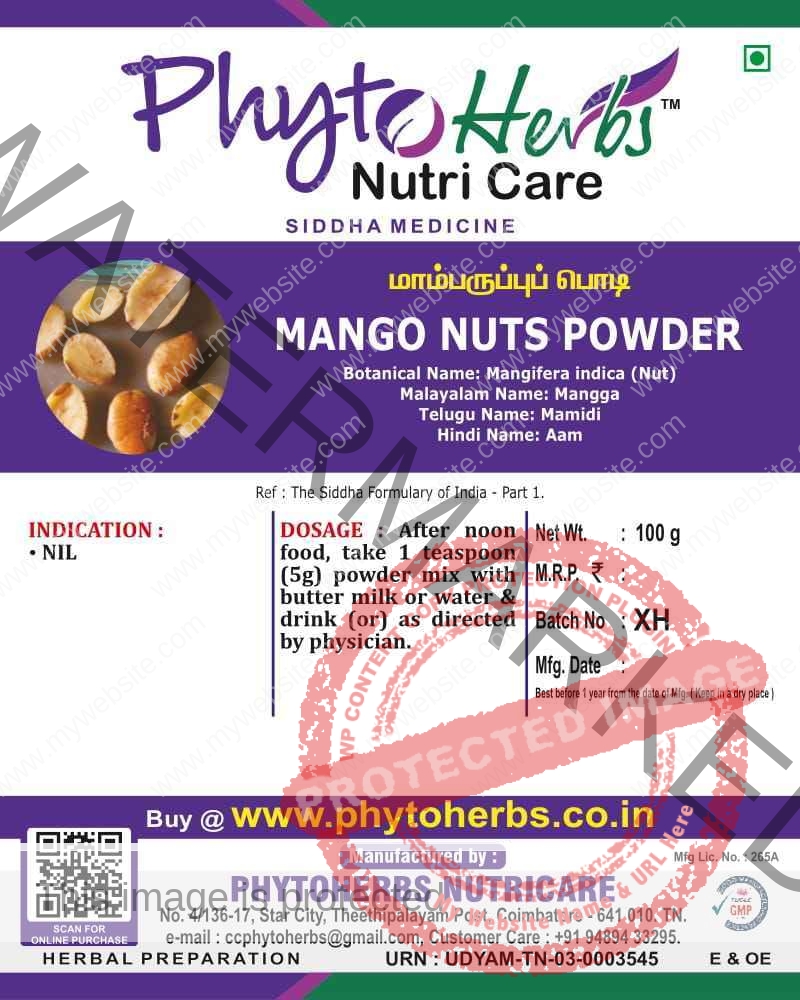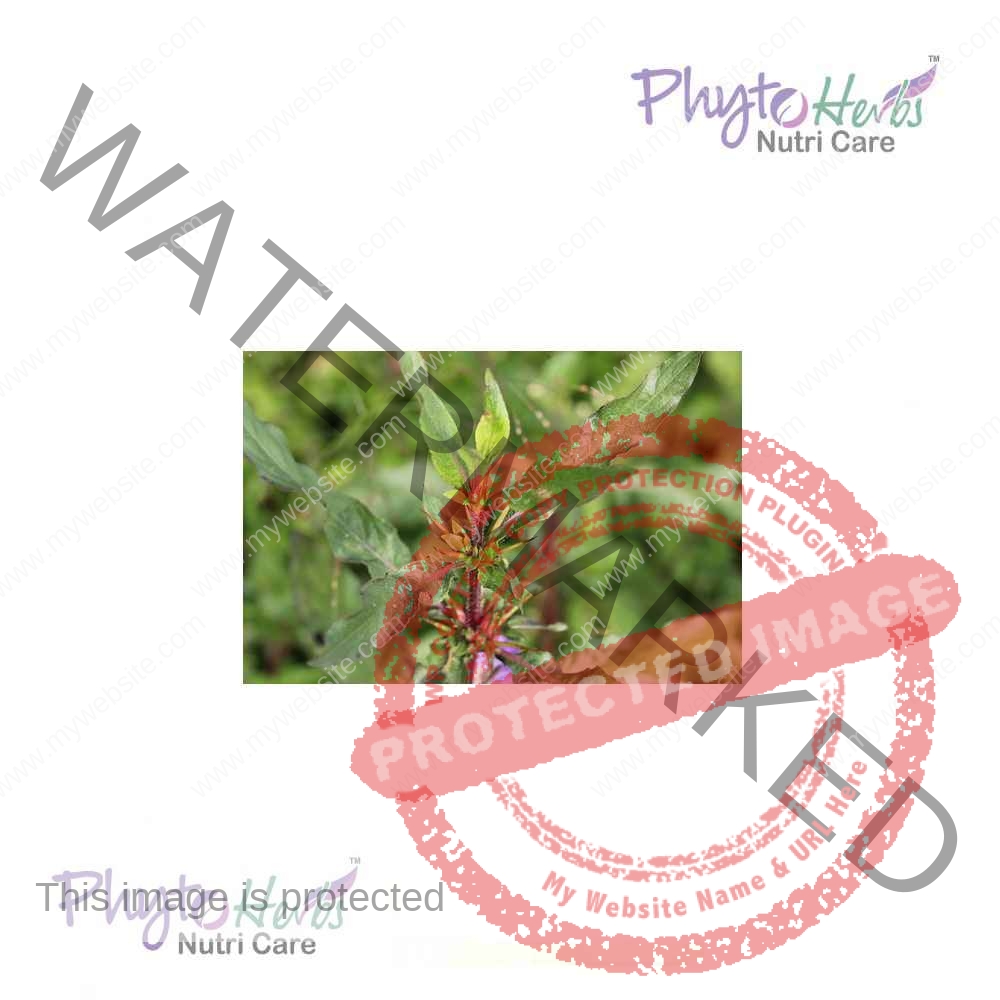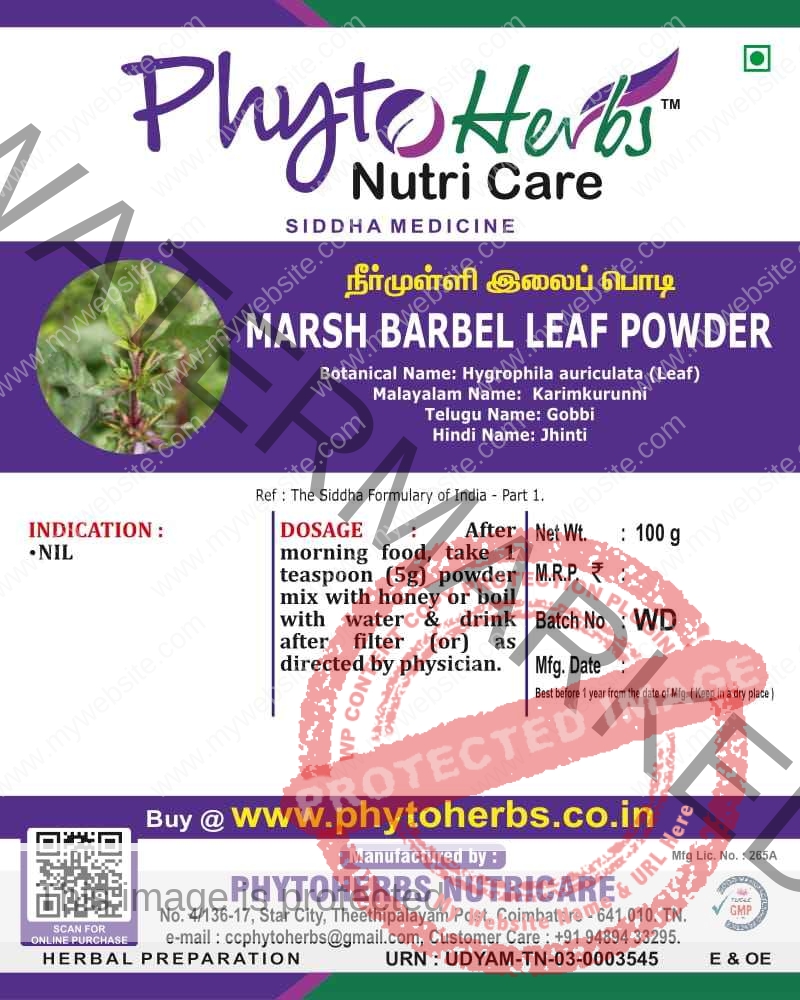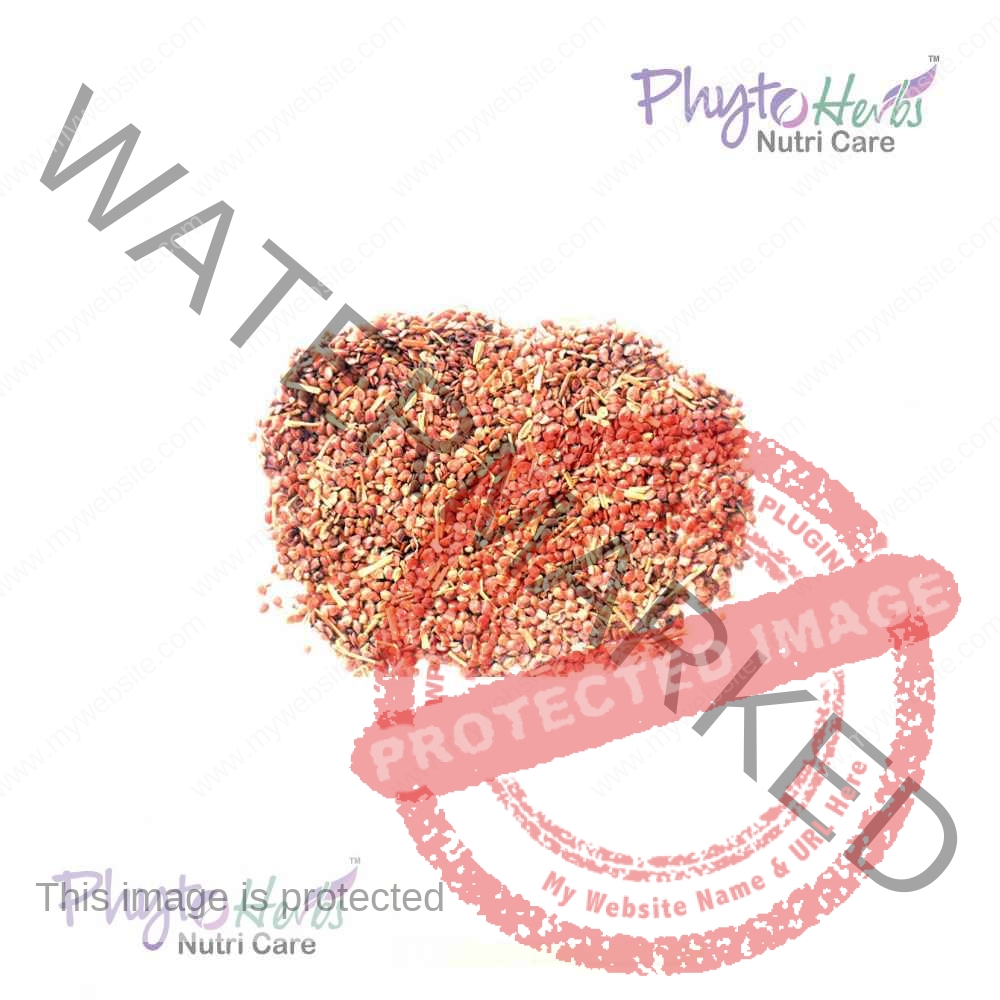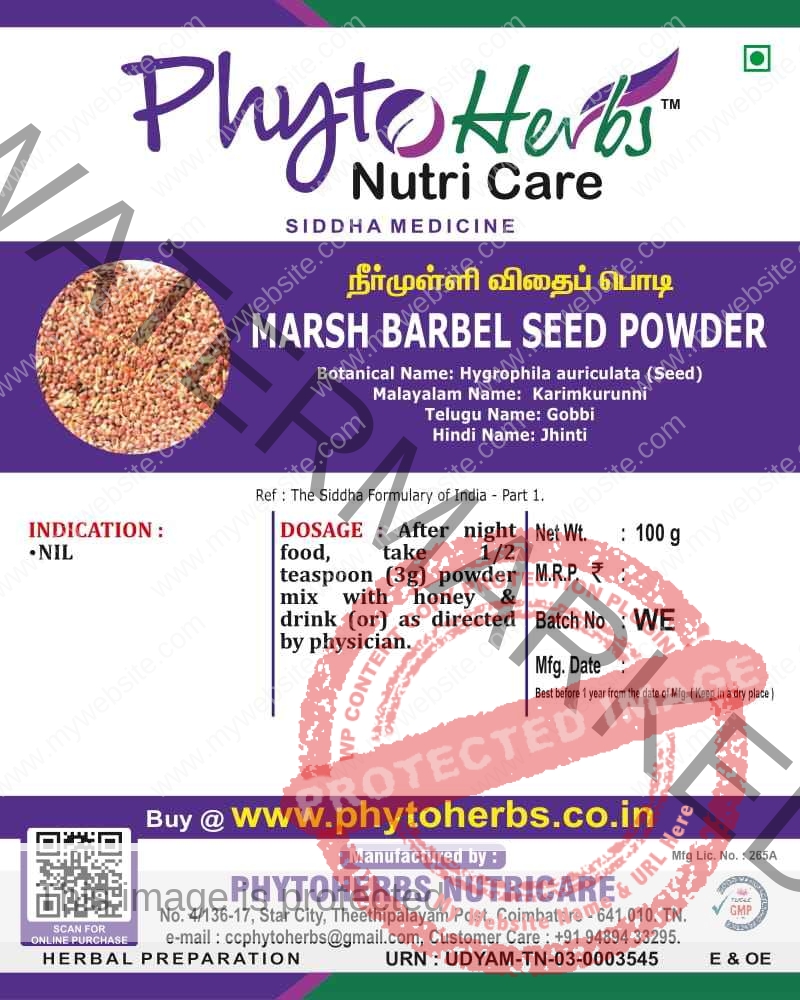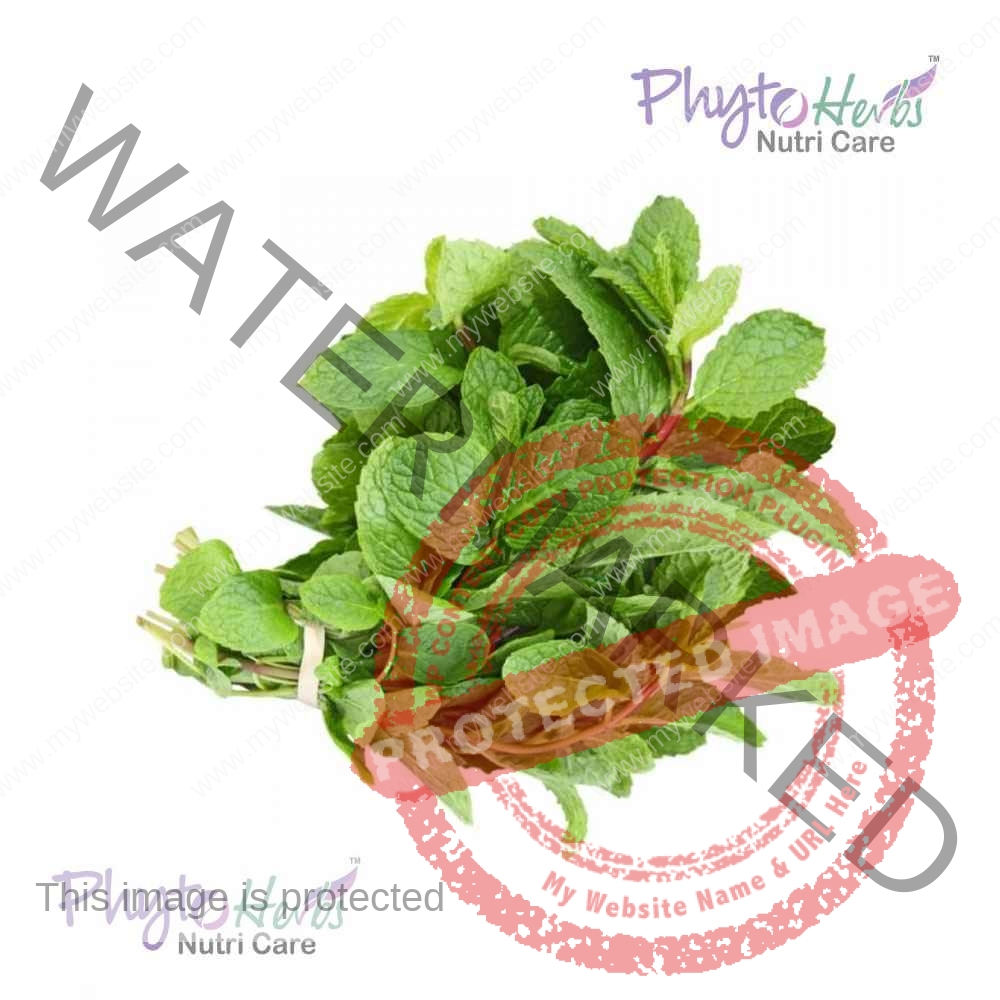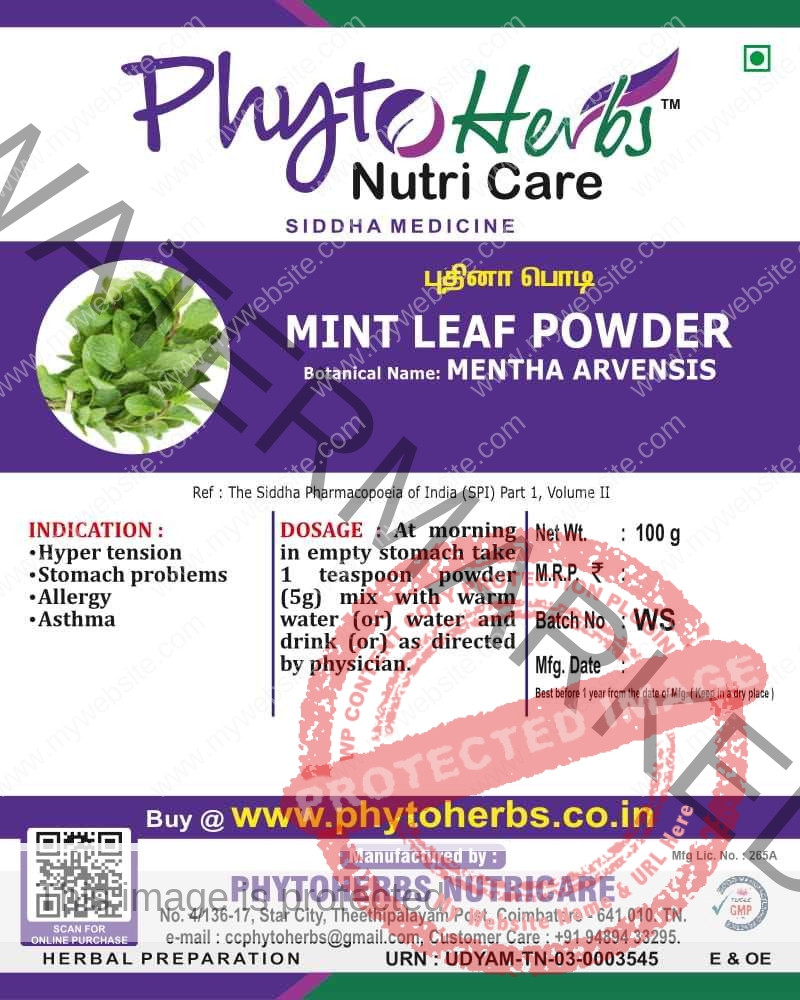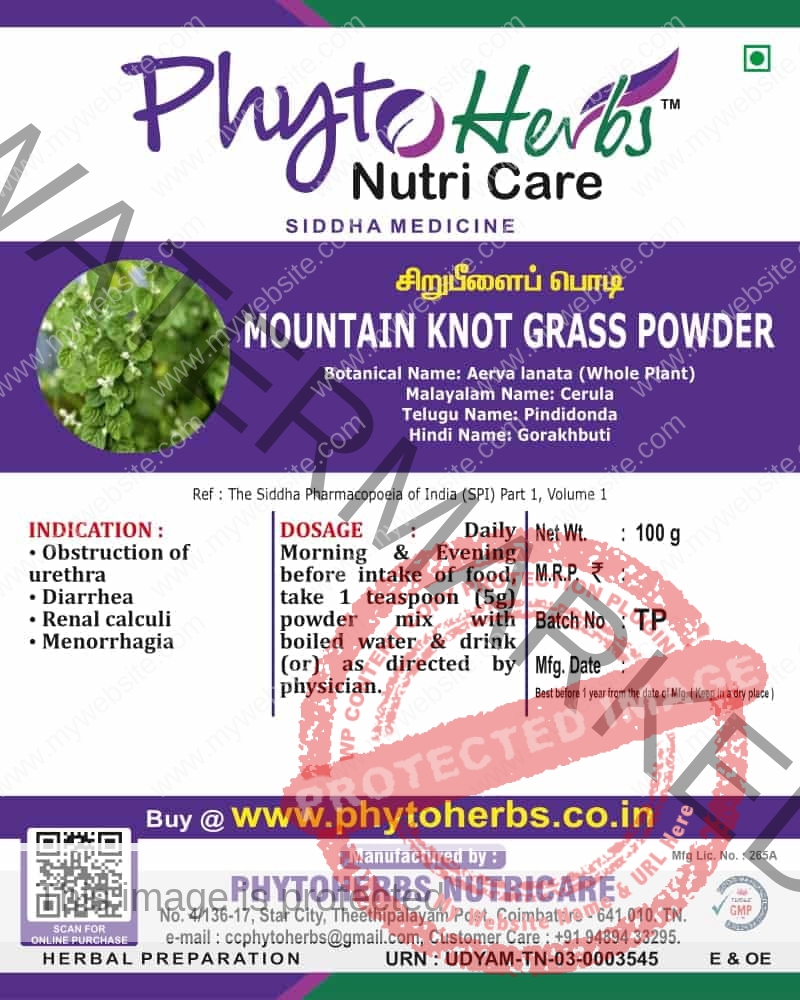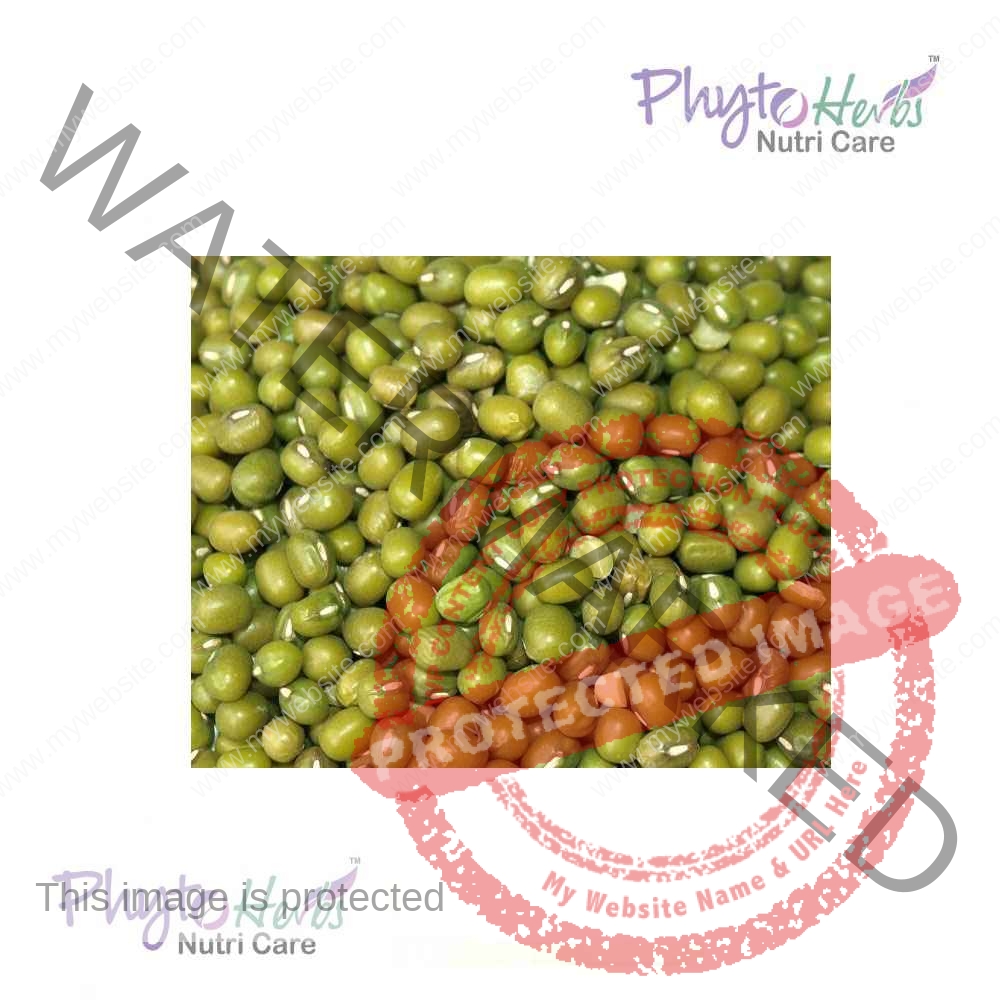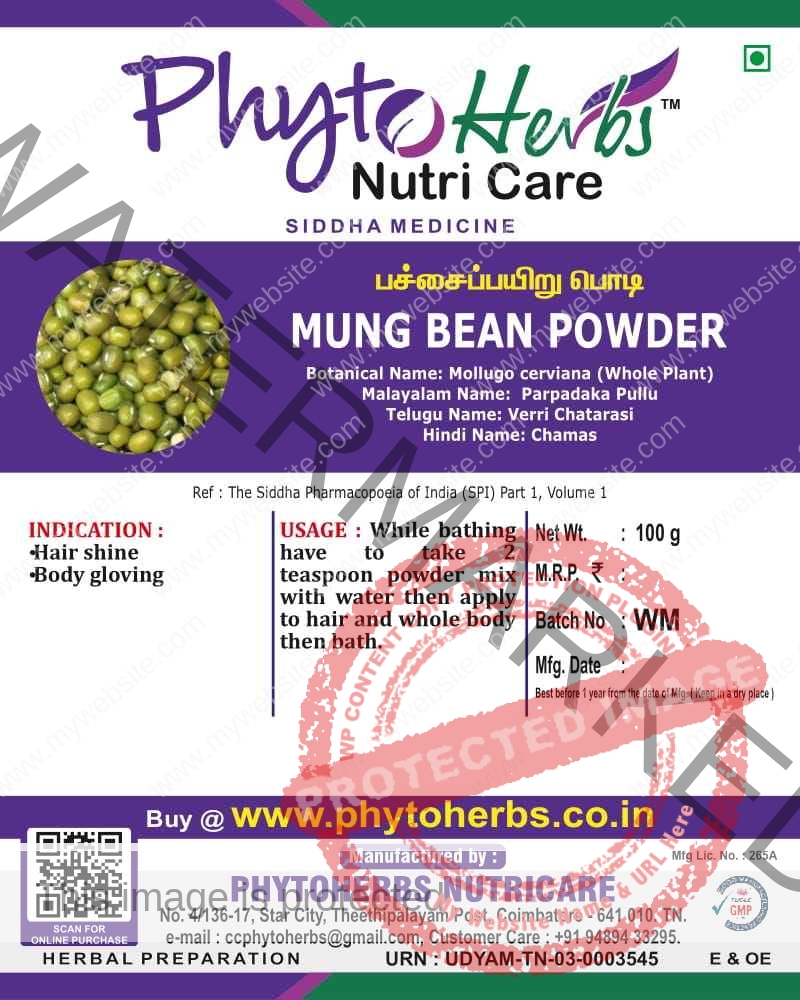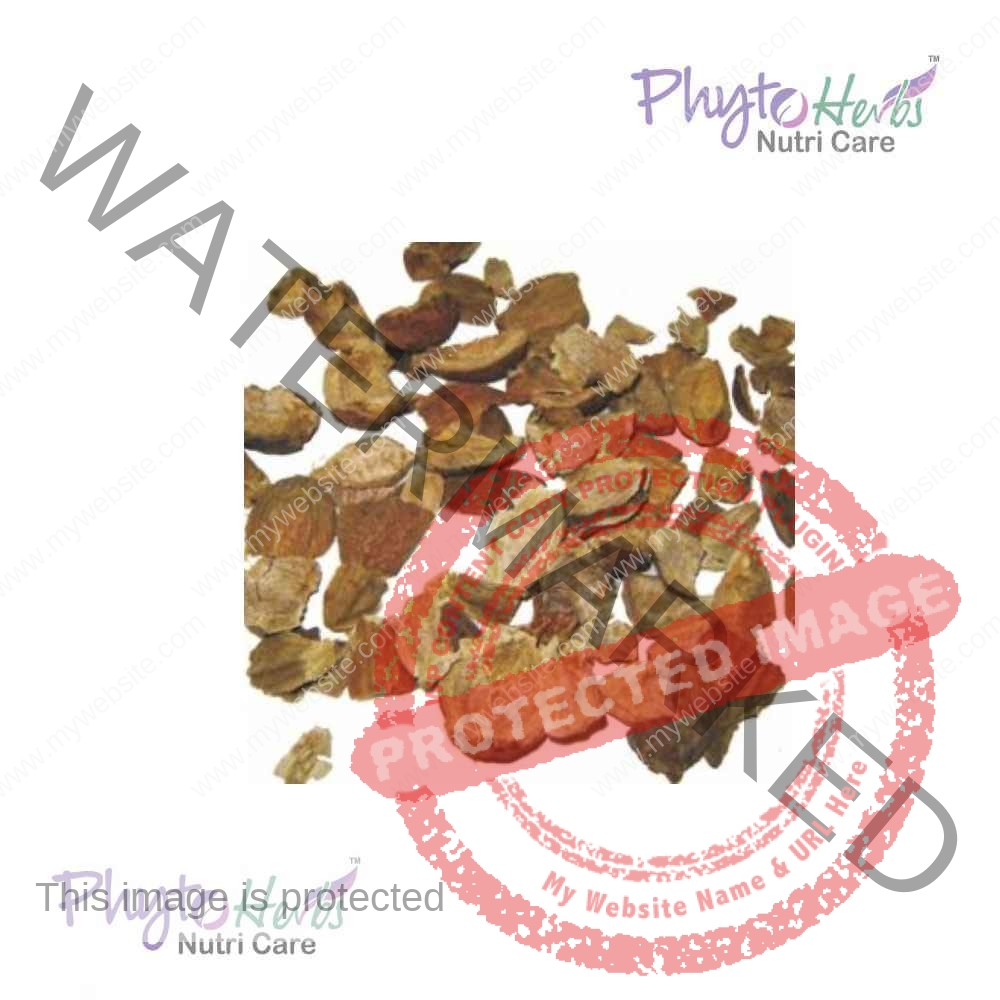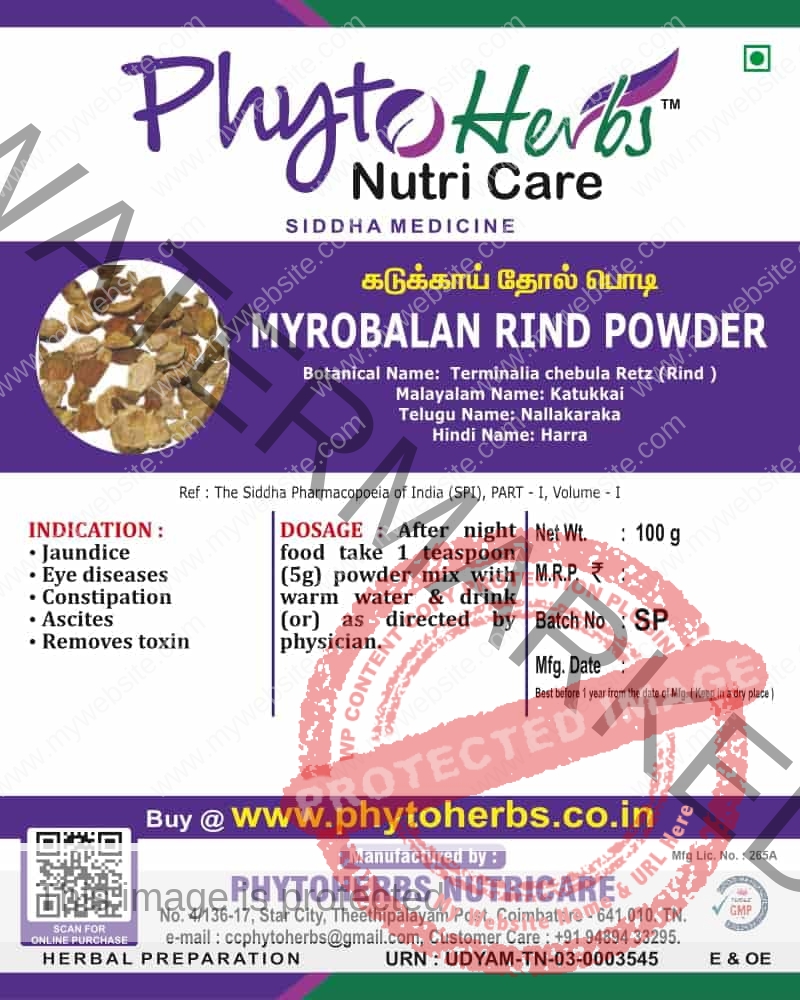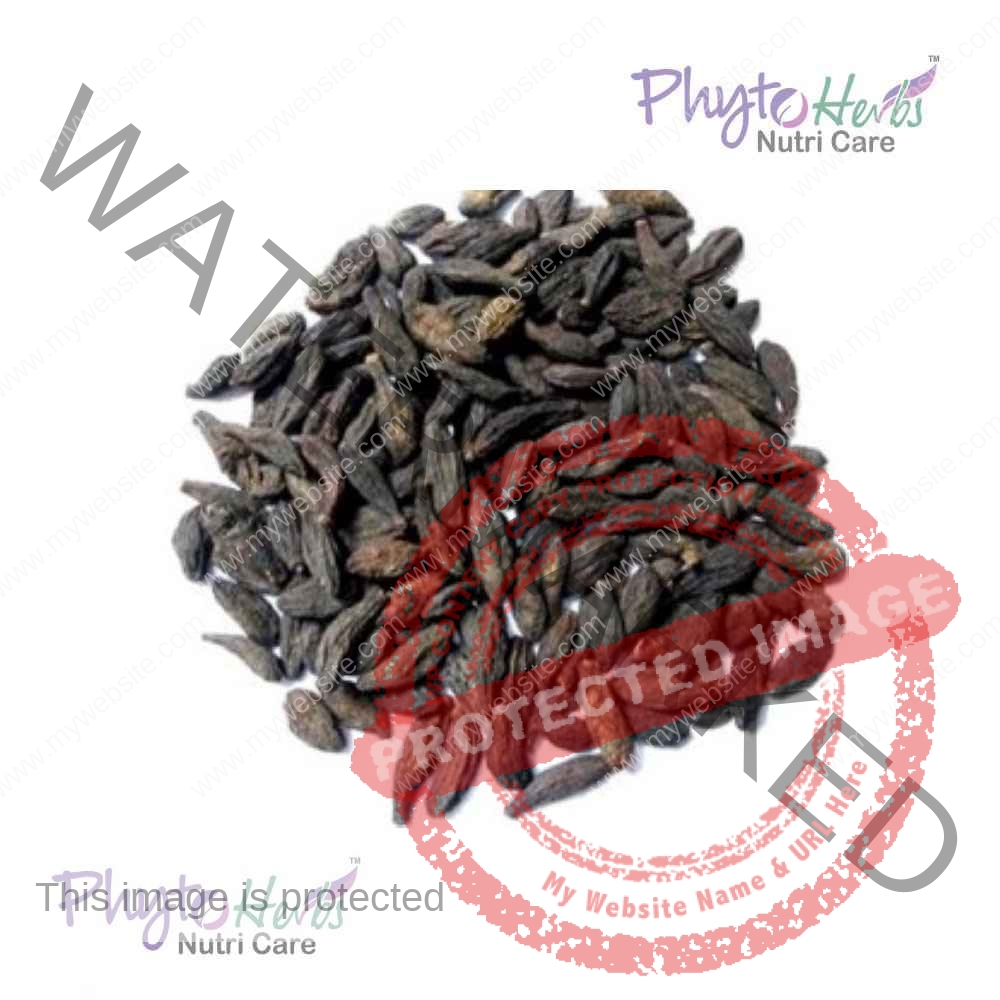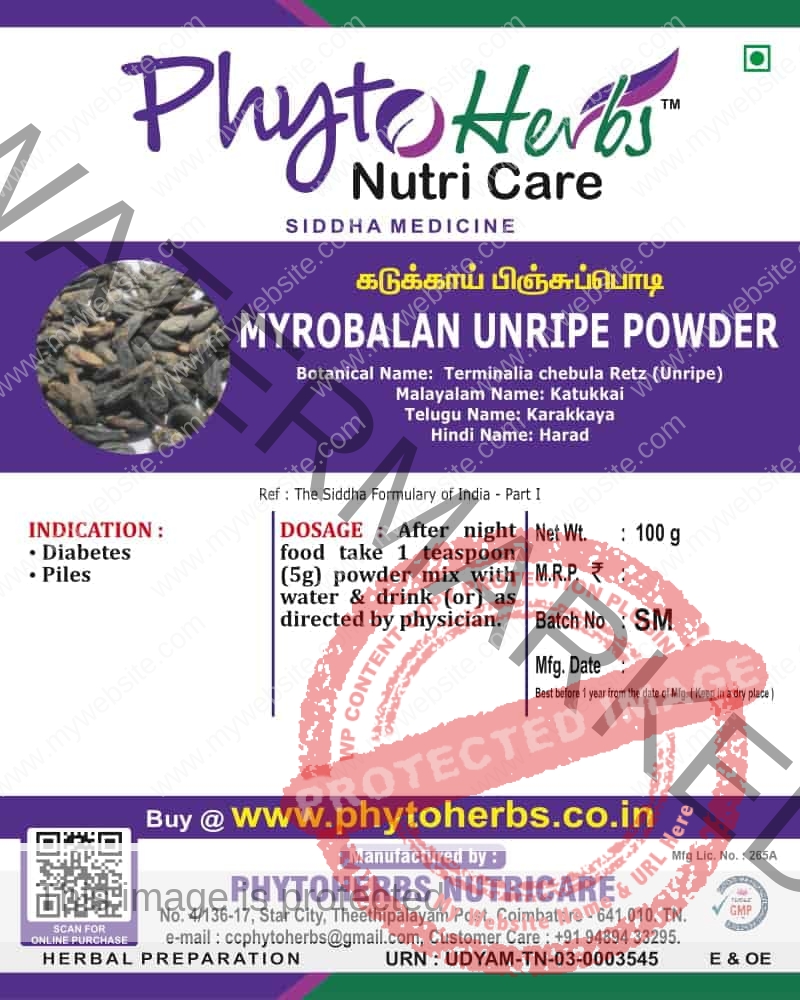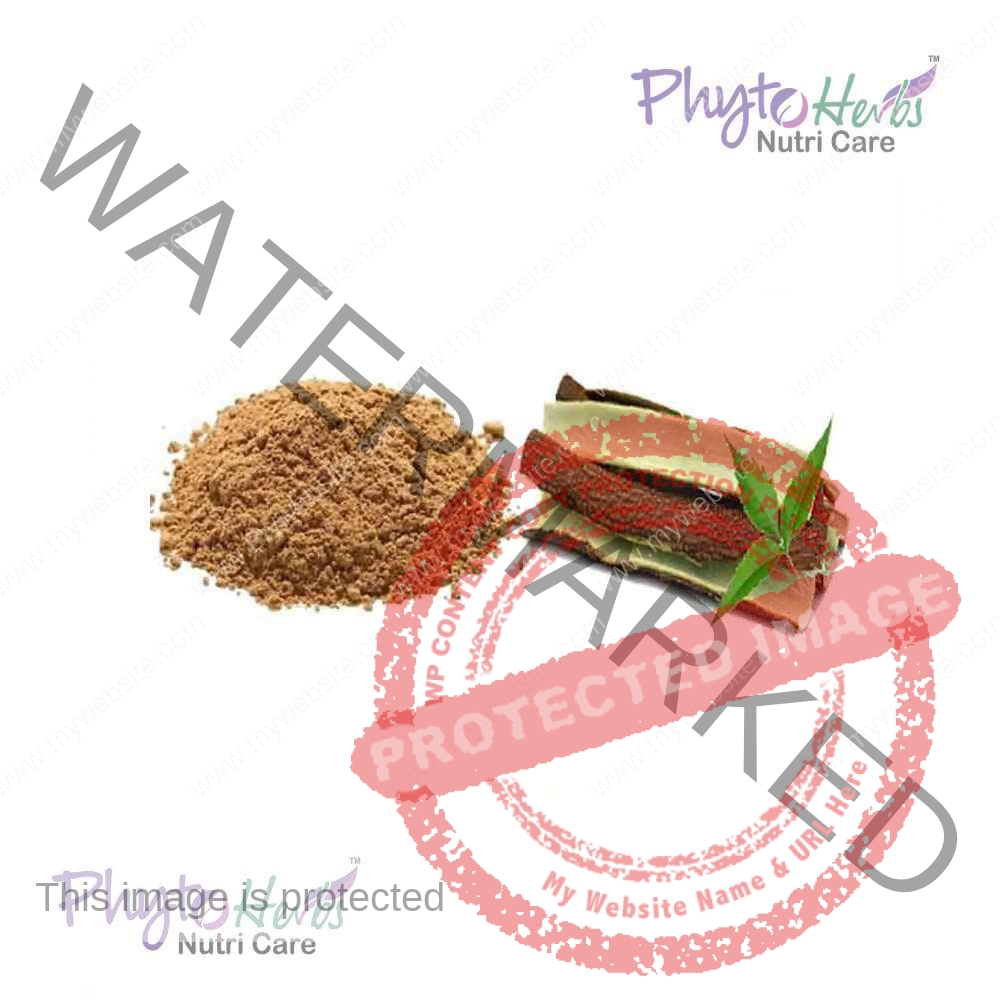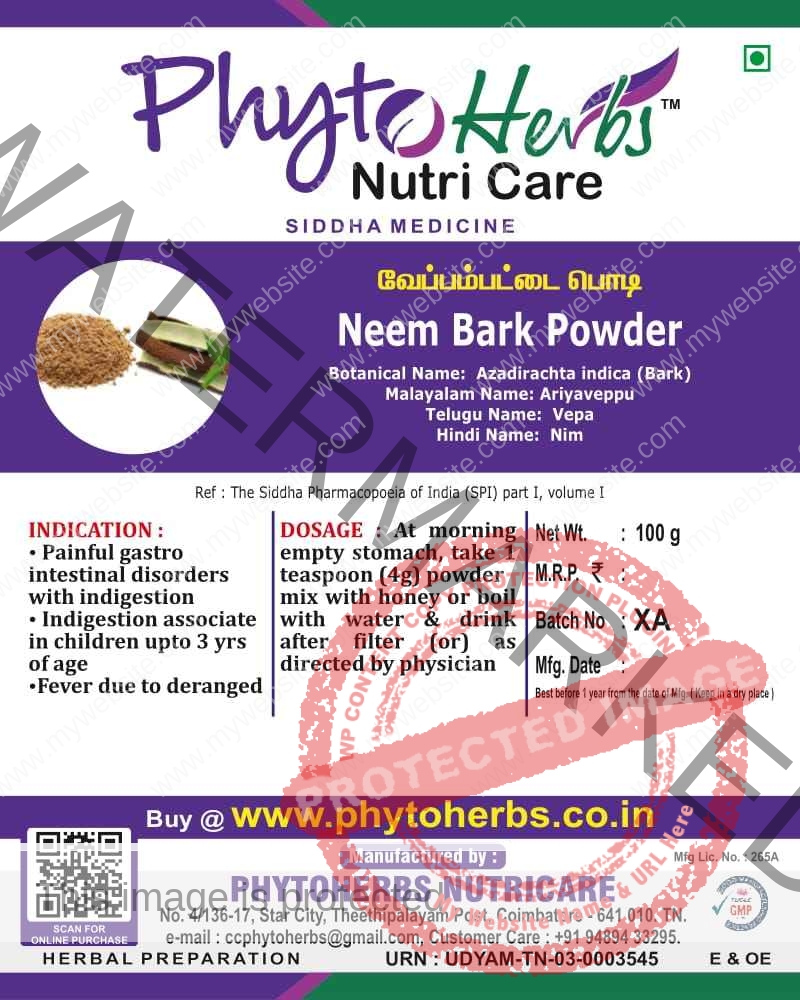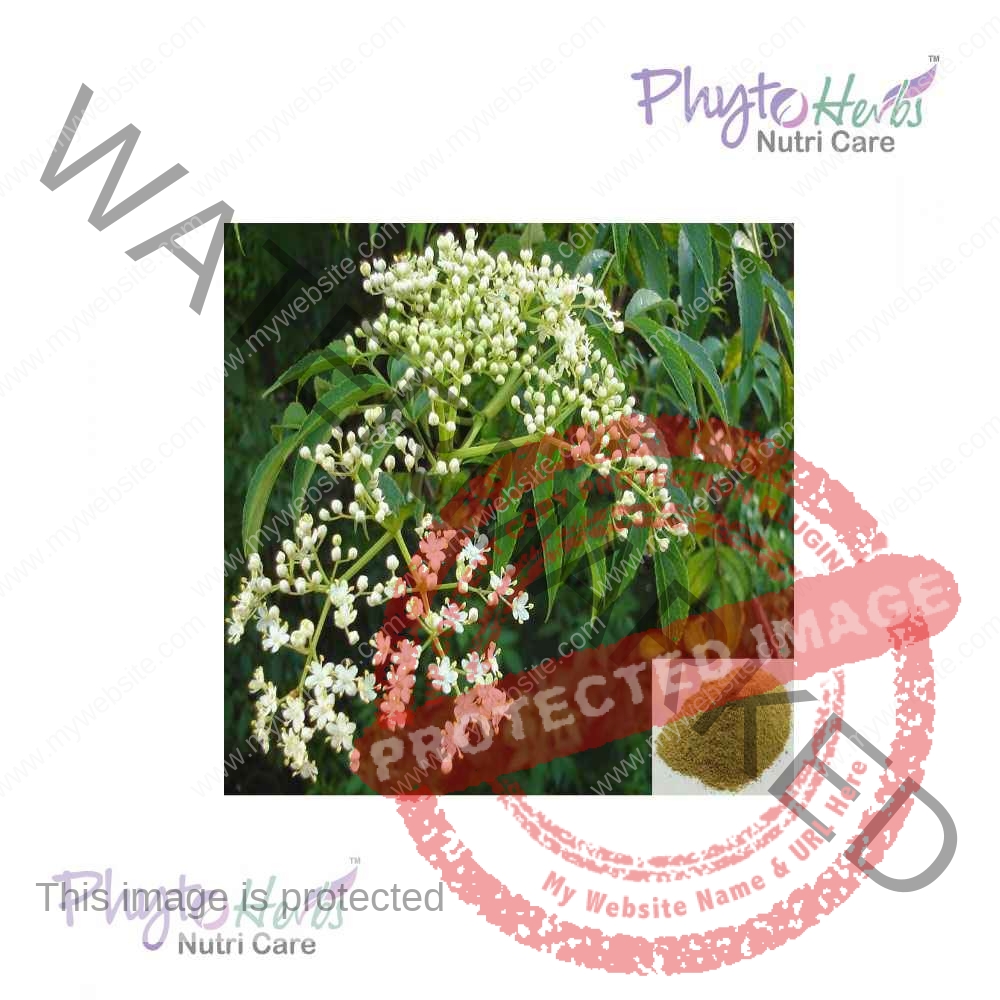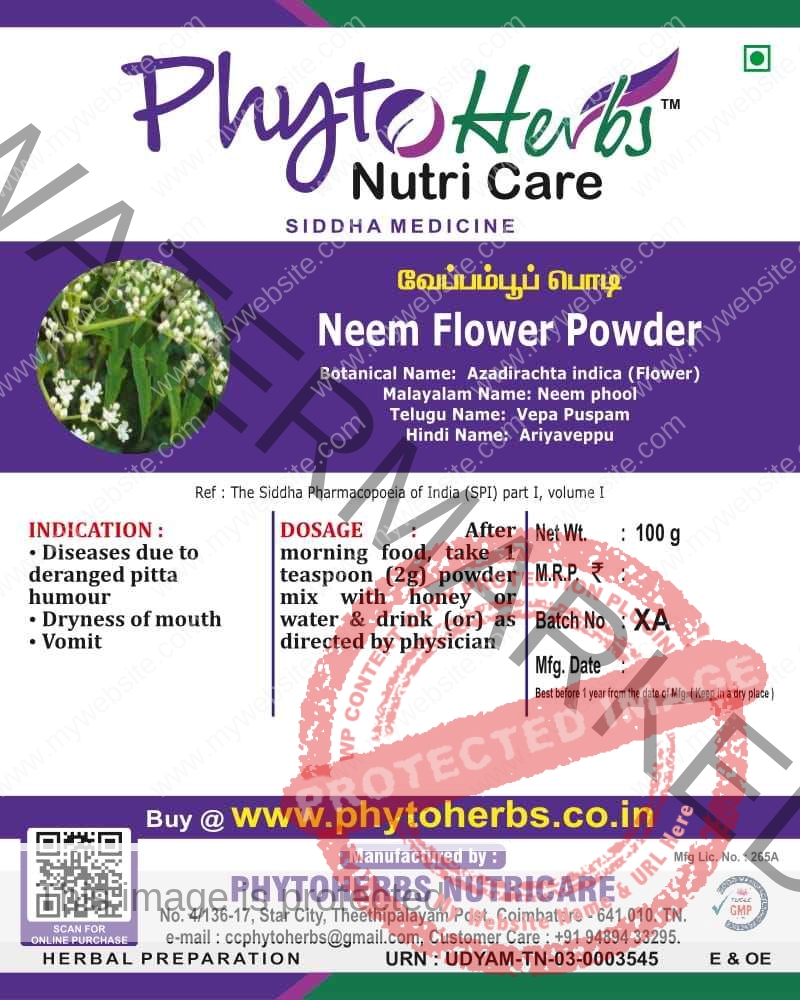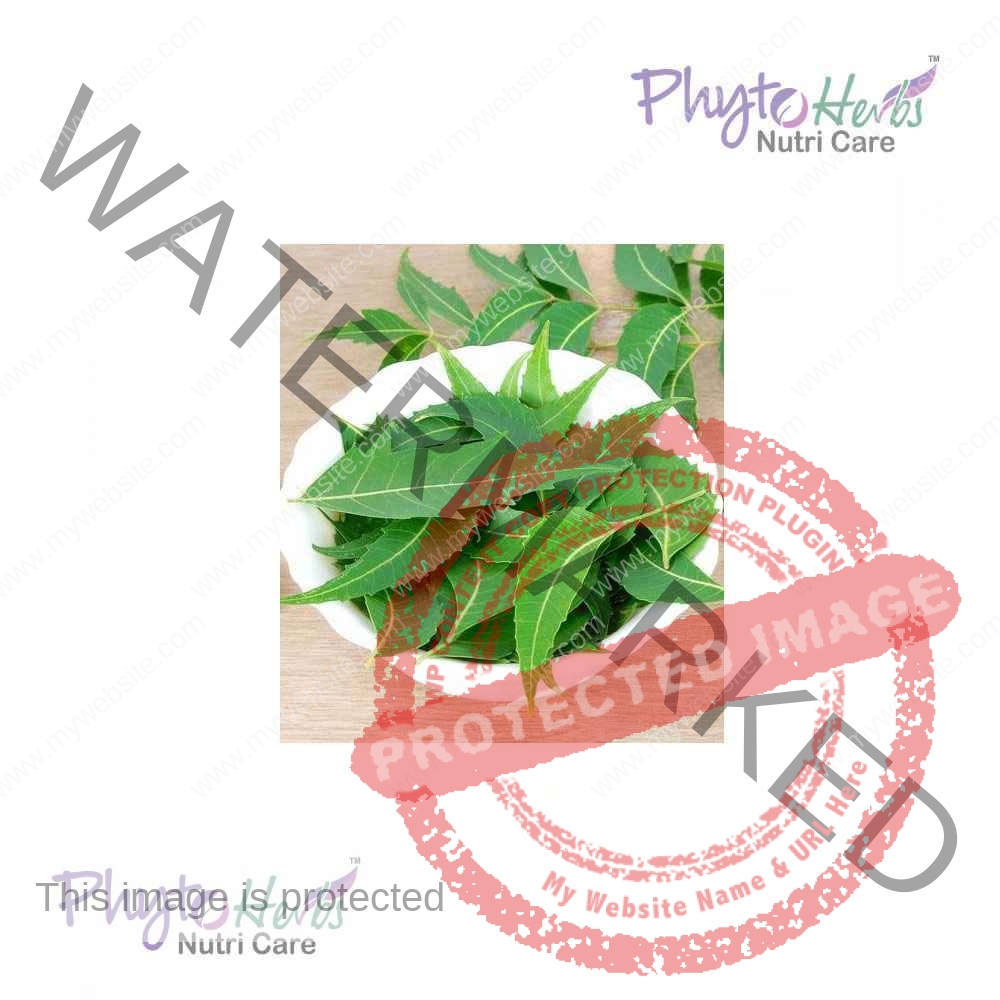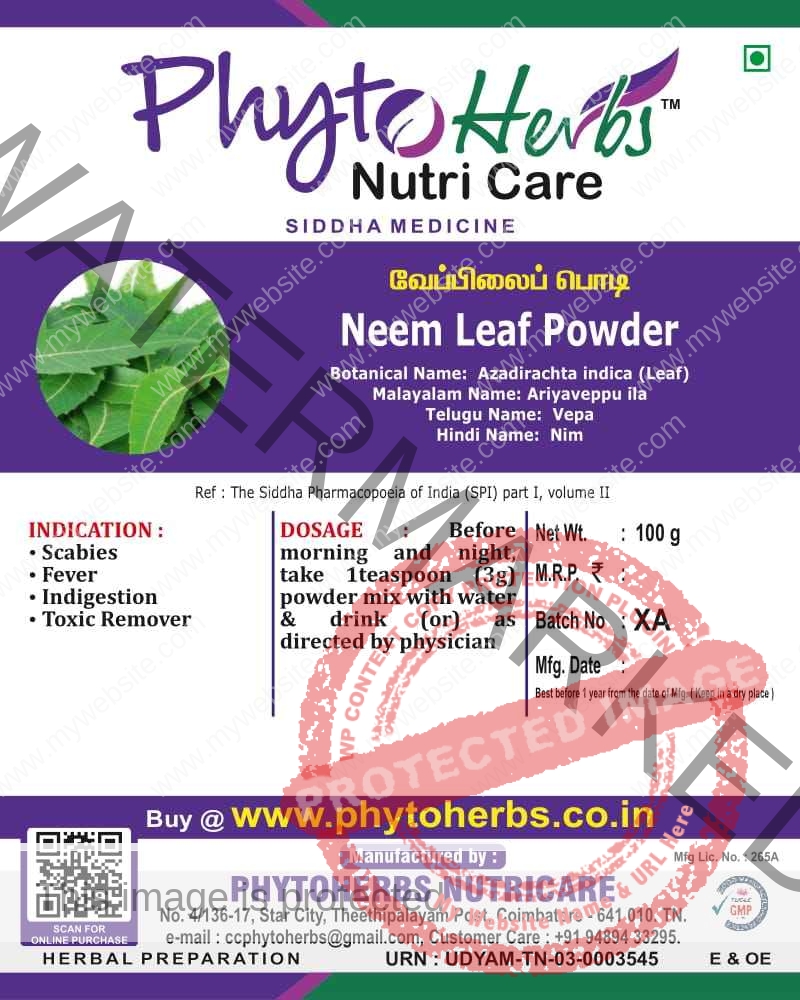Showing 85–96 of 145 results
Show filter-
Mango Leaf Powder / மா இலைப் பொடி
₹50.00 – ₹250.00Botanical Name: Mangifera indica (Leaf)
Tamil Name: மா இலைப் பொடி / Maa ilai Podi
Malayalam Name: മാങ്ങാ ഇല / Mangga ila
Telugu Name: మామిడి ఆకు / Mamidi aku
Hindi Name: आम पत्ती / Aam PatteeDescription: The Mango (Mangifera indica) is one of the most important tropical plants. Mangifera indica is a species of mango in the Anacardiaceae family. Traditional Uses: Various parts of plant are used as a dentrifrice, antiseptic, astringent, diaphoretic, stomachic, vermifuge, tonic, laxative and diuretic and to treat diarrhea, dysentery, anaemia, asthma, bronchitis, cough, hypertension, insomnia, rheumatism, toothache, leucorrhoea, haemorrhage and piles. All parts are used to treat abscesses, broken horn, rabid dog or jackal bite, tumour, snakebite, stings, datura poisoning, heat stroke, miscarriage, anthrax, blisters, wounds in the mouth, tympanitis, colic, diarrhea, glossitis, indigestion, bacillosis, bloody dysentery, liver disorders, excessive urination, tetanus and asthma. Decoction of mango kernel is used, for example, in the treatment of diarrhea, haemorrhages, and bleeding haemorrhoids for its vermifuge and astringent properties, extracts of unripe fruit, bark and leaves are used for their antibiotic activity, while an aqueous stem bark extract from Mangifera indica is used in Cuba as a remedy for diarrhoea, fever, gastritis, and ulcers.
Description:
The Mango (Mangifera indica) is one of the most important tropical plants. Mangifera indica is a species of mango in the Anacardiaceae family.
Traditional Uses: Various parts of plant are used as a dentrifrice, antiseptic, astringent, diaphoretic, stomachic, vermifuge, tonic, laxative and diuretic and to treat diarrhea, dysentery, anaemia, asthma, bronchitis, cough, hypertension, insomnia, rheumatism, toothache, leucorrhoea, haemorrhage and piles. All parts are used to treat abscesses, broken horn, rabid dog or jackal bite, tumour, snakebite, stings, datura poisoning, heat stroke, miscarriage, anthrax, blisters, wounds in the mouth, tympanitis, colic, diarrhea, glossitis, indigestion, bacillosis, bloody dysentery, liver disorders, excessive urination, tetanus and asthma. Decoction of mango kernel is used, for example, in the treatment of diarrhea, haemorrhages, and bleeding haemorrhoids for its vermifuge and astringent properties, extracts of unripe fruit, bark and leaves are used for their antibiotic activity, while an aqueous stem bark extract from Mangifera indica is used in Cuba as a remedy for diarrhoea, fever, gastritis, and ulcers. Dosage: After morning and night food, take 1/2 teaspoon (3g) powder mix with water & drink (or) as directed by physician.After morning and night food, take 1/2 teaspoon (3g) powder mix with water & drink (or) as directed by physician. -
Mango Nuts Powder / மாம் பருப்புப் பொடி
₹70.00 – ₹350.00Botanical Name: Mangifera indica (Nut)
Tamil Name: மாம் பருப்புப் பொடி / Maam Paruppu Podi
Malayalam Name: മാങ്ങാ / Mangga
Telugu Name: మామిడి / Mamidi
Hindi Name: आम / AamDescription:
The Mango (Mangifera indica) is one of the most important tropical plants. Mangifera indica is a species of mango in the Anacardiaceae family.
Traditional Uses: Various parts of plant are used as a dentrifrice, antiseptic, astringent, diaphoretic, stomachic, vermifuge, tonic, laxative and diuretic and to treat diarrhea, dysentery, anaemia, asthma, bronchitis, cough, hypertension, insomnia, rheumatism, toothache, leucorrhoea, haemorrhage and piles. All parts are used to treat abscesses, broken horn, rabid dog or jackal bite, tumour, snakebite, stings, datura poisoning, heat stroke, miscarriage, anthrax, blisters, wounds in the mouth, tympanitis, colic, diarrhea, glossitis, indigestion, bacillosis, bloody dysentery, liver disorders, excessive urination, tetanus and asthma. Decoction of mango kernel is used, for example, in the treatment of diarrhea, haemorrhages, and bleeding haemorrhoids for its vermifuge and astringent properties, extracts of unripe fruit, bark and leaves are used for their antibiotic activity, while an aqueous stem bark extract from Mangifera indica is used in Cuba as a remedy for diarrhoea, fever, gastritis, and ulcers.Dosage: After noon food, take 1 teaspoon (5g) powder mix with butter milk or water & drink (or) as directed by physician.
-
Marsh Barbel Leaf Powder / நீர்முள்ளி இலைப் பொடி
₹70.00 – ₹350.00Botanical Name: Hygrophila auriculata (Leaf)
Tamil Name: நீர்முள்ளி இலைப் பொடி / Neermulli Ilai Podi
Malayalam Name: കരിങ്കുറഞ്ഞി / Karimkurunni
Telugu Name: గొబ్బి / Gobbi
Hindi Name: झिण्टी / JhintiDescription:
Hygrophila auriculata or Marsh Barbel (English) is commonly used to call in Tamil as a Neermulli. An annual herbal plant grows up to 60cms altitude. The plant stem is tetragonal, hairy and stiffened at the nodes. The bark is dark brown, although the leaves are elliptic-lanceolate and hispid. The flowers are violet and somewhat purple-blue. Therapeutically, it is useful in inflammation, calculus, hyperactive thirst, diarrhea, poisoning, pain, anemia, abdominal disorders, flatulence, urine retention, burning sensation, rheumatoid arthritis, Prameha, vision disorders, and blood disorders.
Medicinal Uses: Its leaf is useful in a cough. Also useful for anal fistula. Its seed is useful in blood disorders. Intake of root decoction is useful for jaundice. Its vegetable is useful in anemia. Neermulli’s root and a whole part decoction are useful in rheumatoid arthritis.
Pharmacological Activities: It has various pharmocological activities viz., aphrodisiac, liver protecting, hypoglycemic, hematopoietic, antioxidant and neuroprotective.Dosage: After morning food, take 1 teaspoon (5g) powder mix with honey or warm water & drink after filter (or) as directed by physician.
-
Marsh Barbel Seed Powder / நீர்முள்ளி விதைப் பொடி
₹110.00 – ₹550.00Botanical Name: Hygrophila auriculata (Seed)
Tamil Name: நீர்முள்ளி விதைப் பொடி / Neermulli vithai Podi
Malayalam Name: കരിങ്കുറഞ്ഞി / Karimkurunni
Telugu Name: గొబ్బి / Gobbi
Hindi Name: झिण्टी / JhintiDescription:
Hygrophila auriculata or Marsh Barbel (English) is commonly used to call in Tamil as a Neermulli. An annual herbal plant grows up to 60cms altitude. The plant stem is tetragonal, hairy and stiffened at the nodes. The bark is dark brown, although the leaves are elliptic-lanceolate and hispid. The flowers are violet and somewhat purple-blue. Therapeutically, it is useful in inflammation, calculus, hyperactive thirst, diarrhea, poisoning, pain, anemia, abdominal disorders, flatulence, urine retention, burning sensation, rheumatoid arthritis, Prameha, vision disorders, and blood disorders.
Traditional Uses: Traditionally, it is used for the treatment of anasaraca, diseases of urinogenital tract, edema of chronic Bright’s disease, hyperdipsia, vesical calculi, flatulence, diarrhea, dysentery, leucorrhoea, gonorrhoea, asthma, blood diseases, gastric diseases, painful micturition, and menorrhagea.
Medicinal Uses: Its leaf is useful in a cough. Also useful for anal fistula. Its seed is useful in blood disorders. Intake of root decoction is useful for jaundice. Its vegetable is useful in anemia. Neermulli’s root and a whole part decoction are useful in rheumatoid arthritis.
Pharmacological Activities: It has various pharmocological activities viz., aphrodisiac, liver protecting, hypoglycemic, hematopoietic, antioxidant and neuroprotective.Dosage: After night food, take 1/2 teaspoon (3g) powder mix with honey & drink (or) as directed by physician.
-
Mint Leaf Powder / புதினா பொடி
₹110.00 – ₹550.00Botanical Name: Mentha arvensis (Leaf)
Tamil Name: புதினா பொடி / Pudina Podi
Malayalam Name: പുടിനെ / Pudina
Telugu Name: ఇగాఇంగ్లీకూర / Igaenglikoora
Hindi Name: बन पुदीना / Ban PudinaDescription:
Mint or Mentha arvensis belonging to the family Lamiaceae which is a common edible and aromatic perennial herb. It is cultivated throughout India and widely used in pharmaceutical, cosmetic and flavoring industries. Unani System of medicine had described a number of types of Podina. They extensively used it for various human ailments as is evident from ancient Unani classical literature.
Traditional Uses: Traditionally, it has been used for hypertension and in patients with ischemic heart disease. Juice of leaves is given in diarrhea and dysentery. The leaves medicinally used for stomach problems and allergy. It is also used for the treatment of liver and spleen disease, asthma and jaundice. The infusion of these leaves is used in indigestion, rheumatic pains, arthritis, and as remedy for inflamed joints.Dosage: At morning empty stomach take 1 teaspoon powder (5g) mix with warm water (or) water and drink (or) as directed by physician.
-
Mountain Knot Grass Powder / சிறுபீளைப் பொடி
₹60.00 – ₹300.00Botanical Name: Aerva lanata (Whole Plant)
Tamil Name: சிறுபீளைப் பொடி / Sirupeelai Podi
Malayalam Name: ചെറൂള / Cerula
Telugu Name: పిండిదొండ / Pindidonda
Hindi Name: गोरखबूटी / GorakhbutiDescription:
Aerva lanata is also known as knot grass is prostate herb in family Amaranthaceae. It is a traditional plant in India used in Ayurvedic and Siddha for many diseases like anti diuretic, infections, cough, antidote, emollient, and skin infections. It also useful for Urolithiasis (Urolithiasis is the stone formation in the urinary bladder or in urinary tract), Acute renal failure (Loss of Kidney Function), Antimicrobial activity, Antifertility, Antihyperglycemic activity, Antiulcer, Antioxidant activity (Oxidative damage cause chronic diseases), and Anti asthmatic activity.
Therapeutic Uses: சதையடைப்பு (Obstruction of urethra), கழிச்சல் (Diarrhoea), கல்லடைப்பு (Renal calculi), குருதி வாந்தி (Blood Vomiting), நீர்சுருக்கு (Dysuria), பெரும்பாடு (Menorrhagia), வீக்கம் (Swelling).Dosage: Daily morning & evening before intake of food, take 1 teaspoon (5g) powder mix with boiled water & drink (or) as directed by physician.
-
Mung Bean Powder / பச்சைப்பயிறு பொடி
₹50.00 – ₹250.00Botanical Name: Vigna radiata (Seed)
Tamil Name: பச்சைப்பயிறு பொடி / Pachchaipayiru Podi
Malayalam Name: കട്ട് ഉളുണ്ട് / Kattu Uluntu
Telugu Name: పెసులు / Pesulu
Hindi Name: बन उरद / मूंग दाल / Ban Urad / Moong DalDescription:
The mung bean (Vigna radiata) is one of the most important short-season, summer-cultivated legumes. The seeds and sprouts are excellent sources of antioxidants in China, India, Bangladesh, and Southeast Asia. It has been known to be an excellent source of protein, dietary fiber, minerals, vitamins, and significant amounts of bioactive compounds, including polyphenols, polysaccharides, and peptides. Hence, it becoming a popular functional food in promoting good health. The mung bean has been documented to ameliorate hyperglycemia, hyperlipemia, and hypertension, and prevent cancer and melanogenesis, as well as possess hepatoprotective and immunomodulatory activities.
External Uses: It also used to externally for head bath.
External Usage: While bathing have to take 2 teaspoon powder mix with water then apply to hair and whole body then bath. -
Myrobalan Rind Powder / கடுக்காய் தோல் பொடி
₹50.00 – ₹250.00Botanical Name: Terminalia chebula Retz (Rind)
Tamil Name: கடுக்காய் தோல் பொடி / Kadukkai Thol Podi
Malayalam Name: കടുക്ക / Katukka
Telugu Name: నల్లకరక / Nallakaraka
Hindi Name: हर्रा / HarraDescription:
Terminalia chebula Retz (combretaeae) is a medicinal plant widely distributed throughout India, Burma, and Srilanka. Terminalia chebula is one of the most commonly used plants in traditional systems of medicine in Indian sub-continent. It is also called as “King of Medicine” in Tibet and is always listed at the top of the list in Ayurvedic Materia Medica due to its extraordinary power of healing. Traditional Uses: Terminalia chebula is routinely used as traditional medicine in the name of ‘Kadukkaai’ by tribal of Tamil Nadu in India to cure several ailments such as fever, cough, diarrhea, gastroenteritis, skin diseases, candidiasis, urinary tract infection and wound infections. It is also commonly used to treat diabetes, piles, cancer, cardiovascular diseases, paralysis, leprosy, ulcers, gout, arthritis, and epilepsy. Therapeutic Indications: காமாலை, கண் நோய்கள் (Eye diseases), மலக்கட்டு (Constipation), பெருவயிறு (Ascitis / Extended abdomen), விடம் (Poison / Toxin).Dosage: After night food, take 1 teaspoon (5g) powder mix with warm water & drink (or) as directed by physician.
-
Myrobalan Unripe Powder / கடுக்காய் பிஞ்சுப்பொடி
₹110.00 – ₹550.00Botanical Name: Terminalia chebula Retz (Unripe)
Tamil Name: கடுக்காய் பிஞ்சுப்பொடி / Kadukkai Pinju Podi
Malayalam Name: കാട്ടുകൈ / Katukkai
Telugu Name: కరక్కాయ / Karakkaya
Hindi Name: हरड़ / HaradDescription:
Terminalia chebula Retz (combretaeae) is a medicinal plant widely distributed throughout India, Burma, and Srilanka. Terminalia chebula is one of the most commonly used plants in traditional systems of medicine in Indian sub-continent. It is also called as “King of Medicine” in Tibet and is always listed at the top of the list in Ayurvedic Materia Medica due to its extraordinary power of healing.
Traditional Uses: Terminalia chebula is routinely used as traditional medicine in the name of ‘Kadukkaai’ by tribal of Tamil Nadu in India to cure several ailments such as fever, cough, diarrhea, gastroenteritis, skin diseases, candidiasis, urinary tract infection and wound infections. It is also commonly used to treat diabetes, piles, cancer, cardiovascular diseases, paralysis, leprosy, ulcers, gout, arthritis, and epilepsy.Dosage: After night food, take 1 teaspoon (5g) powder mix with water & drink (or) as directed by physician.
-
Neem Flower Powder / வேப்பம்பூப் பொடி
₹110.00 – ₹550.00Botanical Name: Azadirachta indica (Flower)
Tamil Name: வேப்பம்பூப் பொடி / Veppam Poo Podi
Malayalam Name: ആര്യവേപ്പ് പട്ട / Neem phool
Telugu Name: వెపా పువ్వు / Vepa Puspam
Hindi Name: नीम फूल / AriyaveppuDescription:
Neem (Azadirachta indica) belonging to Maliaceae family which is very important medicinal plant which is traditionally used to treat different diseases. Each part of the neem tree has some medicinal property. It has been used in different medicinal systems: Ayurveda, Siddha, Unani, and Homeopathic medicine.
Pharmacological Activities: Numerous biological and pharmacological activities have been reported including antibacterial, antifungal, and anti-inflammatory. It also confirmed their role as anti-inflammatory, antiarthritic, antipyretic, hypoglycemic, antigastric ulcer, antifungal, antibacterial, and antitumour activities. Neem flowers are used to treat Bile suppression, Phlegm, and Elimination of intestinal worms.
Therapeutic Uses: அழல் நோய்கள் (Diseases due to deranged pitta humour), சுவையின்மை, குடற்ப்புழு, நாவறட்சி (Dryness of mouth), நீடித்த வளி நோய், வாந்தி (Vomit).Dosage: After morning food, take 1 teaspoon (2g) powder mix with honey or water & drink (or) as directed by physician.
-
Neem Leaf Powder / வேப்பிலைப் பொடி
₹50.00 – ₹250.00Botanical Name: Azadirachta indica (Leaf)
Tamil Name: வேப்பிலைப் பொடி / Veppilai Podi
Malayalam Name: ആര്യവേപ്പ് / Ariyaveppu ila
Telugu Name: వెపా / Vepa
Hindi Name: नीम / NimDescription:
Neem (Azadirachta indica) belonging to Maliaceae family which is very important medicinal plant which is traditionally used to treat different diseases. Each part of the neem tree has some medicinal property. It has been used in different medicinal systems: Ayurveda, Siddha, Unani, and Homeopathic medicine.
Pharmacological Activities: Numerous biological and pharmacological activities have been reported including antibacterial, antifungal, and anti-inflammatory. It also confirmed their role as anti-inflammatory, antiarthritic, antipyretic, hypoglycemic, antigastric ulcer, antifungal, antibacterial, and antitumour activities. Neem leaves are used to treat Leprosy, Eye problems, and Epistaxis.
Therapeutic Uses: அம்மை புண் (Chickenpox Wound), சிறங்கு / சொறி (Scabies), சுரம் / காய்ச்சல் (Fever), மந்தம் (Indigestion), பெரு நோய், வயிறுப்புழு, விஷமுறிவு.Dosage: Before morning and night, take 1 teaspoon (3g) powder mix with water & drink (or) as directed by physician.


